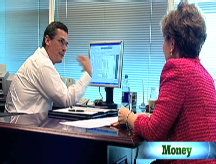Lousy 401(k)? Lousy economy? Get a Roth!
Employer-sponsored retirement plans can be great savings vehicles, but not every employer offers a good one. You could be better off investing in a Roth IRA.
 |
| Money Magazine senior writer Janice Revell |
NEW YORK (Money) -- You might be listening to the symphony of financial experts extolling the virtues of a 401(k) plan, often touted as the best way to save for your golden years. But that's not necessarily the case.
I recently wrote about the best new features of 401(k) plans and how you can go about lobbying your employer to get them. But what if your 401(k) plan at work is just plain lousy?
By that I mean that you receive no company matching contribution and the mutual funds offered in your plan are all larded up with high fees.
This, unfortunately, is a fairly common situation: About one in five 401(k) plans offer no company match. And among smaller 401(k) plans in particular, investment fees of 1.5% or more are common - that means that 20% of your investment gains will simply evaporate every year, assuming average returns. And that's not even counting roughly 40% of Americans who don't have access to a company 401(k) plan at all.
So what should you do?
Well, you should certainly lobby for a better plan. But in the meantime, before you contribute one dime to a no-match, high-fee 401(k) plan, you'll be far better off putting your money into a Roth IRA.
First, here's a quick primer on how the Roth IRA works. You can contribute up to $5,000 to a Roth IRA ($6,000 if you're age 50 or older) in 2008. To be eligible, your modified adjusted gross income must be less than $116,000, or $169,000 as a couple filing jointly.
You have to pay taxes on the money you contribute to a Roth. But then you're finished with paying the IRS: All your future investment gains will be tax-free, as will your withdrawals at retirement.
That's pretty much the mirror opposite of a 401(k) plan, where you contribute pretax dollars, but then pay tax at ordinary income rates on your withdrawals.
From a pure tax standpoint, a Roth IRA is usually a better choice if you expect to be in a higher tax bracket when the time comes to make withdrawals. A pretax vehicle like a 401(k) or traditional IRA is a better option if you expect to be in a lower tax bracket when you retire.
But if you've got a lousy 401(k) plan, the Roth IRA wins hands down, no matter how your tax situation is likely to shake out.
What's more, today's shaky economy makes the case for the Roth even stronger.
For starters, you can slash your investment costs. If you open your IRA with a discount brokerage or mutual fund company, you'll have a much larger universe of low-cost funds to choose from, including index funds.
The difference to your nest egg over the years can be huge. Say, for instance, that you saved $5,000 a year for the next 20 years and received an average annual return of 8% before mutual fund fees.
If you were investing in a mutual fund that charged 1.5% annually, you'd wind up with $194,000, $30,000 less in your pocket than if you'd invested in an index fund that charged 0.2% a year, which would yield a whopping $224,000.
And there's another major advantage the Roth IRA offers in today's economy. If you lose your job or experience some other financial emergency, you can withdraw the contributions you've made to your Roth at any time, tax and penalty free.
This is a crucial point when you consider that only 3 in 10 American households today have 3 months' worth of living expenses saved up for emergencies.
Even traditional IRAs don't allow early withdrawals without penalties. If you want to take cash out of your 401(k) plan, you'll have to pay through the nose.
One option is to take what's known as a "hardship withdrawal." Under IRS rules, you can take money out early, but only for special needs, such as medical bills, a home purchase, college fees and funeral expense. And in most cases (except substantial medical costs), you must pay income taxes and a 10% penalty on the funds.
Your other option is to borrow money from your 401(k); about half of all plans allow 401(k) loans. If you can take a loan, you must pay it back in five years, or you'll owe income taxes and a 10% penalty. Worse, you must repay your 401(k) loan with after-tax money - and you'll pay tax on that money again when you withdraw it in retirement.
But the riskiest part of a 401(k) loan in today's economy is that if you lose your job with an outstanding loan, you'll typically have to repay in full within 30 to 90 days. If you can't scrape up the cash in time, the IRS will treat the loan as a cash withdrawal, meaning you'll have to pay tax and a 10% penalty if you're under the age of 59�.
Bottom line: the Roth IRA provides you with a far more valuable lifeline in the case of a financial emergency. Of course, you should always view tapping into your retirement accounts as a last resort only.
Questions or comments about retirement? Send e-mails to jrevell@moneymail.com. ![]()




